模块一Unit3语言点同步讲解
M1U3Language points 详解 牛津模块一Unit 3

1. I used to go to the gym three times a week, but I don’t work out any more. 我过去每周去体 育馆三次,但现在不再锻炼了。 L 3 used to 后常接动词原形,表示与现在相反的过 去某种习惯,意为“过去常常”。如:
Important points & difficult points: (1) Grasp and practice these important phrases and sentences structures . (2) Understanding the text.
New Words 1. 体形,数字,人物 2. 惭愧的,羞愧的 3. 减肥,瘦身 4.起作用,有效果 5.精力充沛的,充满活力的
1. 渴望做 2. 收到某人的来信 3. 过去常常做 4.锻炼 5. 保持苗条 6. 减肥
反义词 7.对…感到羞愧 8.受某人欢迎
9.吃药 10.至少 11.从…中恢复过来 12.肝脏衰竭 13.后悔做过某事 14.接受医疗护理 15.听从某人的建议 16.损害某人的健康
短语
1. 渴望做
2. 收到某人的来信 3. 过去常常做 4.锻炼 5. 保持苗条 6. 减肥
9.吃药 10.至少 11.从…中恢复过来 12.肝脏衰竭 13.后悔做过某事 14.接受医疗护理
15.听从某人的建议 16.损害某人的健康
take pills L9 at least L8 recover from L18 liver failure L18 regret doing sth L18 receive medical treatment
5. It didn’t take a long time for him tore_c_o_v_e_r_f_r_o_mthe illness. 6. You made a mistake again. Why didn’tfoylolouw__m_y__a_d_v_ic_e_? 7. I think a flat in the centre of the city will costa_t _le_a7s0t0,00$
Module 1 Unit3 Words 讲解(19PPT)

recovery N.
make a recovery from… 从……恢复过来
5. failure n. [U]
a. the state of being not successful 失败
e.g. Failure is the mother of success.
b. not working correctly 失灵,衰竭
Vi. a. (~ at/on sth.) to do an activity which uses effort esp. as employment (从事,劳动,干活)
work at/on my assignment work for sb/sth. 受雇于 work as…从事某工作
b. (of a plan,machine or moving part) to be active in the proper way, without failing (起作用,奏效;顺利进行,运转)
f : vi. progress in a satisfactory way进展顺利 e.g.The plan worked out very well. Things just didn’t workwork n./Vi. [U] 1) activity which uses effort, not for amusement e.g. All work and no play makes Jack a dull boy.
Unit 3 Looking good, feeling good
New words
1. work out
a. to take exercise (=exercise Vi.) 锻炼身体,做运动 e.g. I would work out in the gym after work when I stayed in Nanjing. b. to calculate the answer to (=figure out) 算出,计算 e.g. work out the answer c. to think of a solution to a problem (=figure out) 想出 e.g. It took me some time to work out/figure out how the accident happened.
外研中职国规英语教材基础模块(修订版)第一册unit3Ilikeplayingbadminton
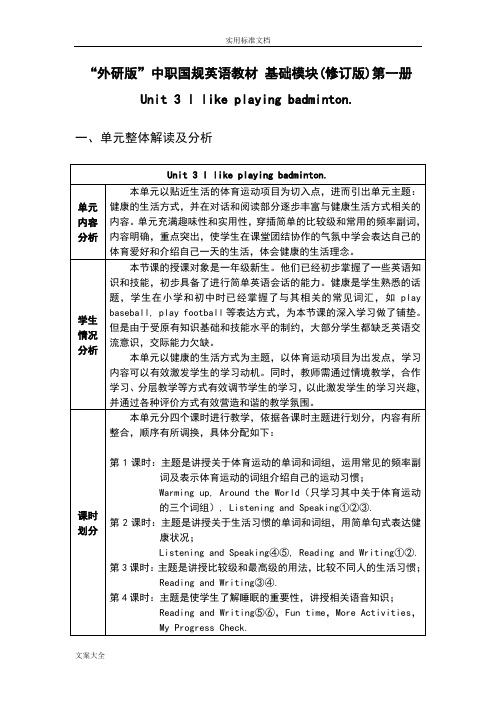
“外研版”中职国规英语教材基础模块(修订版)第一册Unit 3 I like playing badminton.一、单元整体解读及分析Unit 3 I like playing badminton.单元内容分析本单元以贴近生活的体育运动项目为切入点,进而引出单元主题:健康的生活方式,并在对话和阅读部分逐步丰富与健康生活方式相关的内容。
单元充满趣味性和实用性,穿插简单的比较级和常用的频率副词,内容明确,重点突出,使学生在课堂团结协作的气氛中学会表达自己的体育爱好和介绍自己一天的生活,体会健康的生活理念。
学生情况分析本节课的授课对象是一年级新生。
他们已经初步掌握了一些英语知识和技能,初步具备了进行简单英语会话的能力。
健康是学生熟悉的话题,学生在小学和初中时已经掌握了与其相关的常见词汇,如play baseball, play football等表达方式,为本节课的深入学习做了铺垫。
但是由于受原有知识基础和技能水平的制约,大部分学生都缺乏英语交流意识,交际能力欠缺。
本单元以健康的生活方式为主题,以体育运动项目为出发点,学习内容可以有效激发学生的学习动机。
同时,教师需通过情境教学,合作学习、分层教学等方式有效调节学生的学习,以此激发学生的学习兴趣,并通过各种评价方式有效营造和谐的教学氛围。
课时划分本单元分四个课时进行教学,依据各课时主题进行划分,内容有所整合,顺序有所调换,具体分配如下:第1课时:主题是讲授关于体育运动的单词和词组,运用常见的频率副词及表示体育运动的词组介绍自己的运动习惯;Warming up, Around the World(只学习其中关于体育运动的三个词组), Listening and Speaking①②③.第2课时:主题是讲授关于生活习惯的单词和词组,用简单句式表达健康状况;Listening and Speaking④⑤, Reading and Writing①②. 第3课时:主题是讲授比较级和最高级的用法,比较不同人的生活习惯; Reading and Writing③④.第4课时:主题是使学生了解睡眠的重要性,讲授相关语音知识;Reading and Writing⑤⑥,Fun time,More Activities,My Progress Check.二、分课时教学设计第1课时教学目标语言知识目标:能够初步掌握常用频率副词,如always, often,sometimes, never, usually等的用法。
语文版中职英语基础模块1 Unit3重点语言知识汇总

Unit3 Starting a New DayTime and tide wait for no man.岁月不等人。
一、重点单词tide潮汐;潮流;趋势memorize记住,记忆basic基础的,基本的schedule schedule安排时间,预定;日程,计划,节目表list列举arrange安排,整理make use of利用habit习惯daily日常的,每天的play chess下棋method方法,措施tight紧的,严密的;牢固的attend出席,参加staff全体员工free time业余时间relaxation放松,休息hike远足;徒步旅行invite邀请;请求survey调查;民意测验indoor室内的outdoor户外的,室外的suggestion建议,提议;暗示as far as据……,就……,只要……choice选择in my opinion在我看来,我认为apartment公寓;套房subway地铁relax放松,休息shower淋浴;阵雨weather天气,象预报;经受住,变色notice注意,察觉curious好奇的be curious about对……感到好奇sweaty满是汗的,汗津津的be used to习惯于rearrange重新排列form形成,产生二、重点短语Warm-uphave a plan for 有计划make the best use of 充分利用…keep a habit of 养成习惯use odd time 使用空闲时间chat with 与某人闲聊某事have breakfast 吃早饭go cycling 去骑自行车read an English book 读一本英文书listen to the radio 听收音机surf the internet 网上冲浪go shopping 去买东西do homework 做作业watch a movie 看电影go to bed 去睡觉;安歇Listeningbe good for 对……有好处be busy with 忙于;从事have lunch 吃午餐Readingwrite to sb. about... 给某人写信be happy for 为……高兴be glad to 乐意try to 设法;试图help...with... 帮助....学习have a tight schedule 有一个紧张的时间表apart from 除了…外;此外prepare my lessons 准备我的课程attend a staff meeting 参加员工会议once a week 每星期一次do some exercise 做一些锻炼hear from 收到...的来信Speakingon the playground 在操场上talk about 讨论,谈论in one’s free time 在空闲时间do some running 做一些跑步in the early morning 在清晨do some sports 做一些运动after school 放学后do a survey on 做调查such as 例如;譬如;诸如as far as I know 据我所知Culture cornerin the beginning 起初,首先be curious about 对…好奇come to know 知道;发觉at any time of the year在一年中的任何时候be used to sth.习惯于三、重点句子Listening1.——How is everything going?——I’m good.2.——What do you do?——I teach English.3.——Are you busy with your teaching job?——No, not exactly. I still have free time.4.——We can find time to have lunch together.——That’s a great idea.1.——一切都好吗?——我很好。
M1Unit3 语言点同步讲解教师

M1Unit3 语言点同步讲解一、Useful Expressions1. be good at …2. be good to sb.3. be good for…=do good to …4. It’s no good doing sth.5. do exercise =take exercise6. look/sound/smell/feel/taste + adj.7. sb. be made to do8. be dying to do sth.be dying for sth.9. hear from sb.10. hear about/of …11. (will/would) not hear of …12. be ashamed of (oneself for) doing sth.13. be ashamed to do sth.14. to one’s shame15. It’s a shame to do sth.16. lose weightput on weight17. need to do sh.18. need/require/want doing =need to be done19. needn’t have done20. There is no need (for sb.) to do sth.21. work at …work on …22. work out (work out a plan; work out the answer;work out a problem; )23. recover from …24. recover oneself25. recover one’s strength/hea lth26. A be a match for B=A match B27. match A with B28. … be (well) worth doing …29. … be worthy of + being done/to be done …30. get in touch with …keep in touch with …31. go on diets /be on a diet32. come across=run across/into33. join the party/army/WTO34. join sb (in sth/doing sth)join A to B35. get out of …36. build up37. on one’s ownsh of one’s own=one’s own sth38. consider doing sth =think about doing sth39. consider…(as) …=think of … as …在…方面(学得、做得)好;善于…对某人好对… 有益/有用做某事是没有益处的做运动锻炼看起来/听起来/闻起来/感觉起来/尝起来…make sb. do 的被动语态非常渴望做某事;非常渴望某事收到某人的来信;听说… ;听到有关…的事不同意… ;不允许…因做了某事而觉得羞愧(因羞愧)而不愿意做某事/不好意思做某事;因做了某事而感到羞耻令人感到羞愧做某事是可耻的减肥;增加体重;发福发胖需要做某事(某物)需要被… (主动表达被动含义)本没有必要做某事(实际上做了)(某人)没必要做某事从事于(研究、学习等);从事于(写作,创作等)制定;解出算出;解决;运动锻炼从(神志、心态、健康等)…回复到正常状态恢复常态恢复体力/健康A同B相称相配使A同B相称相配(很)值得做(主动表达被动含义)值得做同… 取得联系;同…保持联系节食(偶然)碰到遇见入党/参军/加入世贸组织加入某人(一起做某事);将A同B连接起来从…里出来;推辞掉…;逃避…;放弃…增强(体质等);建设起来(强调从无到有从弱到强)独自地独立地;某人自己的东西考虑做某事将…看作…;把…当成…=look on … as …40. consider…(to be) …consider sb to do sth41. have an (good/bad) effect on …42. take risks/a riskdo sth at the risk of …43. risk doing sth44. A marry Bmarry A to B45. get marriedbe married46. A get married to BA be married to B47. put onput out48. put up withput up49. seem to be …seem to do …seem as if …50. It seems (to sb) that …51. pass by51. what’s more =besides =moreover52. make the most of sth (to do) =make the best useof sth (to do)53. laugh at … / make fun of …54. call sb namescall on e’s namecall sb/sth …55. try to do sth56. try doing sth57. take in58. take up59. give up (doing sth )give up on …60. give in (to …)give out61. concentrate on …concentrate …on …62. a large amount of … =a great deal of …63. in large /small amounts64. cause sth/sb to do sthcause … to sb65. cause of … …reason for … …excuse for … …66. in no time67. right now/away;at once;immediately68. base A on/upon B;A be based on/upon B 认为…是…;认为某人做某事对…有(好的/坏的)影响/作用/效果冒险;冒着…的危险做某事冒险做某事A娶了B或A嫁给了B将A嫁给B结婚(动作);结婚了(状态)A嫁给了B(动作);A嫁给了B(状态)穿上上演增加;扑灭(火等)忍受;张贴搭建(简易建筑)似乎是…;似乎做… ;看上去似乎…(在某人看来)似乎…路过还有而且(作状语)尽可能利用某物(去做某事)嘲笑取笑…骂某人;喊某人的名字;称某人或某物为…努力去做某事(结果未必成功);尝试做某事(目的是寻求改变,强调换一种方法做某事,无需付出努力)吸收/吸取;领会/听懂;欺骗从事(某种活动或工作);占据(时间、空间、注意力等)放弃(做某事);对…绝望(向…)屈服/让步/投降;分发/散发筋疲力尽用完全神贯注于…;把…集中在…上大量的许多的(只修饰不可数名词)大量地/少量地(作状语)使某人做某事/导致某物…;给某人带来(痛苦等)的起因;的原因/理由;的借口立刻/马上(和将来时连用)立刻马上将A建立在B的基础,A是以B为基础的69. compare A with Bcompare A to B 70. compared with/to …将A同B相比较;将A比作B与…相比(作状语,此时with和to无区别)二、Key sentences1. I used to go to the gym three times a week, but I don’t work out any more.我过去每周去体育馆三次,但我现在不再锻炼了。
译林高一英语模块一Unit3知识点梳理
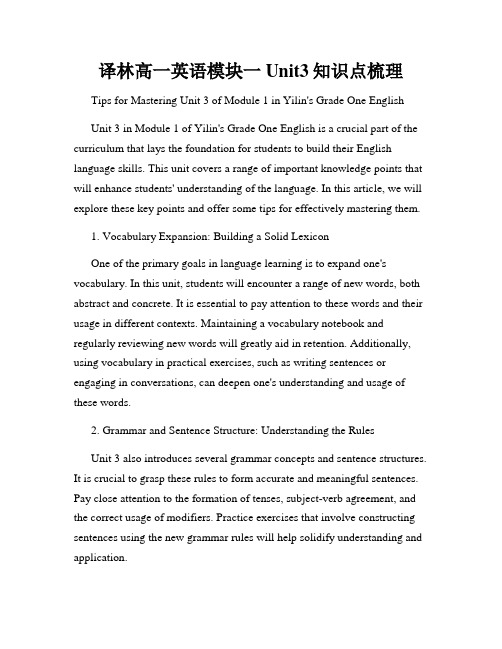
译林高一英语模块一Unit3知识点梳理Tips for Mastering Unit 3 of Module 1 in Yilin's Grade One EnglishUnit 3 in Module 1 of Yilin's Grade One English is a crucial part of the curriculum that lays the foundation for students to build their English language skills. This unit covers a range of important knowledge points that will enhance students' understanding of the language. In this article, we will explore these key points and offer some tips for effectively mastering them.1. Vocabulary Expansion: Building a Solid LexiconOne of the primary goals in language learning is to expand one's vocabulary. In this unit, students will encounter a range of new words, both abstract and concrete. It is essential to pay attention to these words and their usage in different contexts. Maintaining a vocabulary notebook and regularly reviewing new words will greatly aid in retention. Additionally, using vocabulary in practical exercises, such as writing sentences or engaging in conversations, can deepen one's understanding and usage of these words.2. Grammar and Sentence Structure: Understanding the RulesUnit 3 also introduces several grammar concepts and sentence structures. It is crucial to grasp these rules to form accurate and meaningful sentences. Pay close attention to the formation of tenses, subject-verb agreement, and the correct usage of modifiers. Practice exercises that involve constructing sentences using the new grammar rules will help solidify understanding and application.3. Reading Comprehension: Developing Comprehensive SkillsBuilding reading comprehension skills is integral to language learning. In this unit, students will be exposed to various reading materials, such as passages, articles, and stories. Effective reading comprehension involves active reading, which includes previewing the text, annotating important information, making inferences, and summarizing the main points. Regular practice in reading and answering questions will improve comprehension skills and enhance overall English proficiency.4. Listening Comprehension: Fine-tuning Your EarsThe ability to understand spoken English is an essential skill. Unit 3 provides ample opportunities for students to improve their listening comprehension. Active listening involves concentration, understanding context clues, and paying attention to intonation and stress patterns. Engaging in listening exercises and activities, such as watching English movies or listening to podcasts, can significantly enhance this skill.5. Writing: Expressing YourselfWriting is a crucial aspect of language learning. In this unit, students will have opportunities to practice different writing styles, such as formal letters, descriptions, and narratives. To improve writing skills, it is important to practice regularly, seek feedback from teachers or peers, and pay attention to grammar, vocabulary, and sentence structure. Also, reading extensively in English can expose students to various writing styles, which can be adopted and adapted into their own writing.6. Speaking: Developing Fluency and ConfidenceSpeaking fluently and confidently is a common goal for language learners. In Unit 3, oral communication skills are developed through various activities, such as presentations, debates, and role-plays. To improve speaking skills, it is crucial to practice speaking regularly, engage in conversations with classmates or native speakers, and embrace opportunities to speak in English. Additionally, listening to native speakers and imitating their pronunciation and intonation can contribute to fluency and confidence.In conclusion, Unit 3 of Module 1 in Yilin's Grade One English covers a wide range of essential knowledge points. By actively engaging in vocabulary expansion, understanding grammar and sentence structure, enhancing reading and listening comprehension, practicing writing, and developing speaking skills, students can effectively master the content of this unit. Language learning requires consistent effort and practice, so it is important to create a study routine and seek opportunities to use English in everyday life. With dedication and perseverance, students can excel in Unit 3 and beyond.。
牛津英语模块1 unit3 looking good,feeling good reading 血汗整理全部语言点

work out 计算出,解决,结果是… work against 努力反对 work as 做…工作 work off 发泄 work on sth. 从事于..,继续 (这里的sth. 是work 的具体对象) work at sth. 从事…研究… (这里的sth. 只说明所从事工作的性质, 表示时间精力都用在了这事上,并不说明正在做什么)
be ashamed of 为…感到羞愧,难为情 be ashamed of oneself 为自己感到羞愧 be ashamed to do sth. 做某事感到羞愧 be ashamed that+从句 e.g. I’m ashamed of my failure. I’m ashamed of having failed. I’m ashamed that I have failed. {注意} ashamed 是表语形容词,只能做表语,不能放在名词 前作定语。 如可以说He is ashamed of the behavior.但不可说 his ashamed behavior. × 后句可以用shameful. shameful: 某事物行为本身可耻、不道德 I’m ashamed of your shameful behavior.
7. Since I’m preparing to act in a new TV play, I’m taking weight-loss pills called Fat-Less, which are quite popular among young women here.
Since: (conj.) 因为、由于、既然 Since we have no money, we can’t afford the car. (prep.)自从…以来 We haven’t met her since leaving school. (adv.) 从那以后 He left home two years ago and we haven’t heard from him since.
Unit3 language points(语言点)分析

not that ... but (that)意为“不是 因为……而是因为”、“(并) 不是……而是”,用于肯定一个 原因,否定另一个原因,或者肯 定一个判断,否定另一个判断。
content (vt.)使满意, 使满足 content sb./oneself with sth. 使…满足于… I content myself with a glass of coffee everyday.
Not that Charlie’s own life was easy! 这并不是说查理本人生活得就那么 容易。
的;用旧的 2) 精疲力尽的;憔悴的(一般不用在
名词前)
He overcame a bad habit. 他克服了一项恶习。 短语:be overcome with/by… 被 (悲哀、恐怖等)打倒, 因为…… 面崩溃/垮掉。如:
She was overcome with/by grief. 她因为悲伤而崩溃了。
1) pick out a. (从同类当中) 选出……;选择
b. (在许多人当中)看出;辨认出……
pick off 摘取 pick oneself up(倒下的人)站起来 pick up 拾起,(车,船)搭载客人 驾车去接(人),接收(信号,广播、 电视节目),学会(语言) pick up with 在偶然机会认识(人)
cut off切下;割下,砍下
mouthful n. 一口;满口 –ful为形容词 后缀,加在名词之后, 表示“充满的”
的意思。如:
handful 一撮,一把 cupful 一满杯 spoonful 一匙;满匙
牛津高中英语模块一第三单元ureadingpoint知识点详细讲解实用课件

Looking good Feeling good
Helen Lee Oct.27th,2012
牛津高中英语模块一第三单元ureadingpoint知识点详细讲 解实用
1
牛津高中英语模块一第三单元ureadingpoint三单元ureadingpoint知识点详细讲 解实用
12
9. exercise (vi) = take / do exercise (Un) 进行运动
10. The pills really work! ① vi 起作用,有效果,奏效,行得通;工作 The medicine worked and the pain went away. You need to find which method works for you. 你需要找出哪种方法对你最有效。 ② vt./vi. 使运转,运转
(2) conj. +句子
①自从…以来;
Mary hasn’t phoned since she went to Japan.
②因为,既然,由于(= now that)
既然大家都到齐了,我们开始吧。
Since everybody is here, let’s begin.
牛津高中英语模块一第三单元ureadingpoint知识点详细讲 解实用
We worked out a plan of study. I have worked out a new way of doing it. ④ I will give you 5 minutes to work out the problem.
牛津高中英语模块一第三单元ureadingpoint知识点详细讲 解实用
牛津高中英语模块一第三单元ureadingpoint知识点详细讲 解实用
M1Unit3语言点同步讲解

M1Unit3 语言点同步讲解一、Useful Expressions1. be good at …2. be good to sb.3. be good for…=do good to …4. It’s no good doing sth.5. do exercise =take exercise6. look/sound/smell/feel/taste + adj.7. sb. be made to do8. be dying to do sth.be dying for sth.9. hear from sb.10. hear about/of …11. (will/would) not hear of …12. be ashamed of (oneself for) doing sth.13. be ashamed to do sth.14. to one’s shame15. It’s a shame to do sth.16. lose weightput on weight17. need to do sh.18. need/require/want doing =need to be done19. needn’t have done20. There is no need (for sb.) to do sth.21. work at …work on …22. work out (work out a plan; work out the answer;work out a problem; )23. recover from …24. recover oneself25. recover one’s strength/he alth26. A be a match for B=A match B27. match A with B28. … be (well) worth doing …29. … be worthy of + being done/to be done …30. get in touch with …keep in touch with …31. go on diets /be on a diet32. come across=run across/into33. join the party/army/WTO34. join sb (in sth/doing sth)join A to B35. get out of …36. build up37. on one’s ownsh of one’s own=one’s own sth38. consider doing sth =think about doing sth 在…方面(学得、做得)好;善于…对某人好对… 有益/有用做某事是没有益处的做运动锻炼看起来/听起来/闻起来/感觉起来/尝起来…make sb. do 的被动语态非常渴望做某事;非常渴望某事收到某人的来信;听说… ;听到有关…的事不同意… ;不允许…因做了某事而觉得羞愧(因羞愧)而不愿意做某事/不好意思做某事;因做了某事而感到羞耻令人感到羞愧做某事是可耻的减肥;增加体重;发福发胖需要做某事(某物)需要被… (主动表达被动含义)本没有必要做某事(实际上做了)(某人)没必要做某事从事于(研究、学习等);从事于(写作,创作等)制定;解出算出;解决;运动锻炼从(神志、心态、健康等)…回复到正常状态恢复常态恢复体力/健康A同B相称相配使A同B相称相配(很)值得做(主动表达被动含义)值得做同… 取得联系;同…保持联系节食(偶然)碰到遇见入党/参军/加入世贸组织加入某人(一起做某事);将A同B连接起来从…里出来;推辞掉…;逃避…;放弃…增强(体质等);建设起来(强调从无到有从弱到强)独自地独立地;某人自己的东西考虑做某事39. consider…(as) …=think of … as …=look on … as …40. consider…(to be) …consider sb to do sth41. have an (good/bad) effect on …42. take risks/a riskdo sth at the risk of …43. risk doing sth44. A marry Bmarry A to B45. get marriedbe married46. A get married to BA be married to B47. put onput out48. put up withput up49. seem to be …seem to do …seem as if …50. It seems (to sb) that …51. pass by51. what’s more =besides =moreover52. make the most of sth (to do) =make the best useof sth (to do)53. laugh at … / make fun of …54. call sb namescall o ne’s namecall sb/sth …55. try to do sth56. try doing sth57. take in58. take up59. give up (doing sth )give up on …60. give in (to …)give out61. concentrate on …concentrate …on …62. a large amount of … =a great deal of …63. in large /small amounts64. cause sth/sb to do sthcause … to sb65. cause of … …reason for … …excuse for … …将…看作…;把…当成…认为…是…;认为某人做某事对…有(好的/坏的)影响/作用/效果冒险;冒着…的危险做某事冒险做某事A娶了B或A嫁给了B将A嫁给B结婚(动作);结婚了(状态)A嫁给了B(动作);A嫁给了B(状态)穿上上演增加;扑灭(火等)忍受;张贴搭建(简易建筑)似乎是…;似乎做… ;看上去似乎…(在某人看来)似乎…路过还有而且(作状语)尽可能利用某物(去做某事)嘲笑取笑…骂某人;喊某人的名字;称某人或某物为…努力去做某事(结果未必成功);尝试做某事(目的是寻求改变,强调换一种方法做某事,无需付出努力)吸收/吸取;领会/听懂;欺骗从事(某种活动或工作);占据(时间、空间、注意力等)放弃(做某事);对…绝望(向…)屈服/让步/投降;分发/散发筋疲力尽用完全神贯注于…;把…集中在…上大量的许多的(只修饰不可数名词)大量地/少量地(作状语)使某人做某事/导致某物…;给某人带来(痛苦等)的起因;的原因/理由;的借口- 3 -66. in no time67. right now/away;at once;immediately68. base A on/upon B;A be based on/upon B69. compare A with Bcompare A to B70. compared with/to …立刻/马上(和将来时连用)立刻马上将A建立在B的基础,A是以B为基础的将A同B相比较;将A比作B与…相比(作状语,此时with和to无区别)二、Key sentences1. I used to go to the gym three times a week, but I don’t work out any more.我过去每周去体育馆三次,但我现在不再锻炼了。
外研版中职国规英语教材基础模块第一册第3单元_2
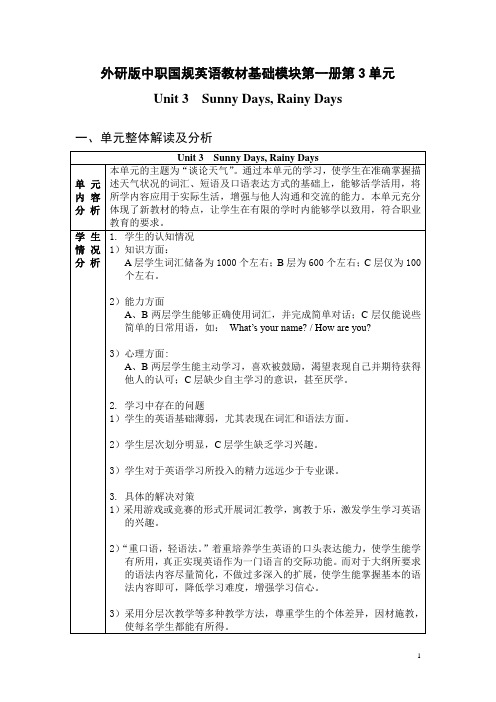
外研版中职国规英语教材基础模块第一册第3单元Unit 3 Sunny Days, Rainy Days
一、单元整体解读及分析
二、分课时教学设计
第1课时
第2课时
第3课时
第4课时
第5课时
第6课时
作者简介: 张冬梅,女,1980年生,讲师。
2004年毕业于渤海大学英语(国际贸易)专业,获文学学士学位。
2005年起任教于辽宁省锦州市第一中等职业技术专业学校。
任职六年来,一直工作在教育教学第一线,并取得一定成绩。
在外研社组织的全国中职英语教师教学设计比赛中获一等奖,并参与了外研社出版的中职英语教材英语(拓展模块)教师用书的编写。
目前,正在攻读教育硕士学位。
牛津高中英语模块一语言点
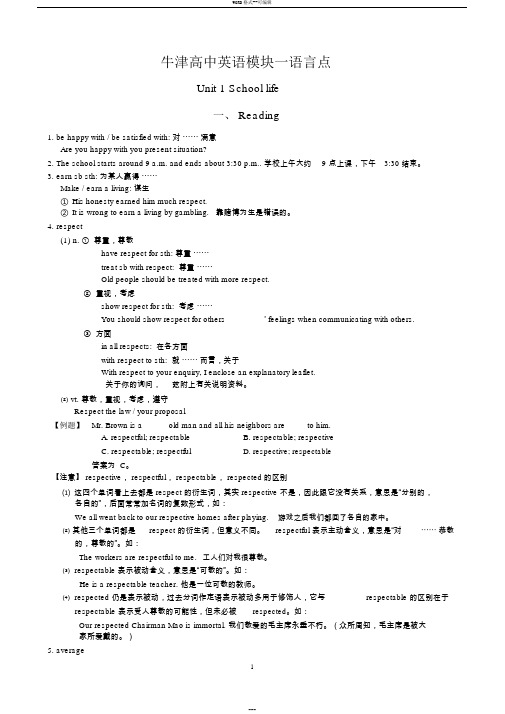
牛津高中英语模块一语言点Unit 1 School life一、 Reading1.be happy with / be satisfied with: 对⋯⋯满意Are you happy with you present situation?2. The school starts around 9 a.m. and ends about 3:30 p.m.. 学校上午大约9 点上课,下午3:30 结束。
3.earn sb sth: 为某人赢得⋯⋯Make / earn a living: 谋生①His honesty earned him much respect.②It is wrong to earn a living by gambling. 靠赌博为生是错误的。
4.respect(1)n. ①尊重,尊敬have respect for sth: 尊重⋯⋯treat sb with respect: 尊重⋯⋯Old people should be treated with more respect.② 重视,考虑show respect for sth: 考虑⋯⋯You should show respect for others’ feelings when communicating with others.③ 方面in all respects: 在各方面with respect to sth: 就⋯⋯而言,关于With respect to your enquiry, I enclose an explanatory leaflet.关于你的询问,兹附上有关说明资料。
⑵ vt. 尊敬,重视,考虑,遵守Respect the law / your proposal【例题】Mr. Brown is a _____ old man and all his neighbors are ____ to him.A. respectful; respectableB. respectable; respectiveC. respectable; respectfulD. respective; respectable答案为 C。
Module1Unit3教案
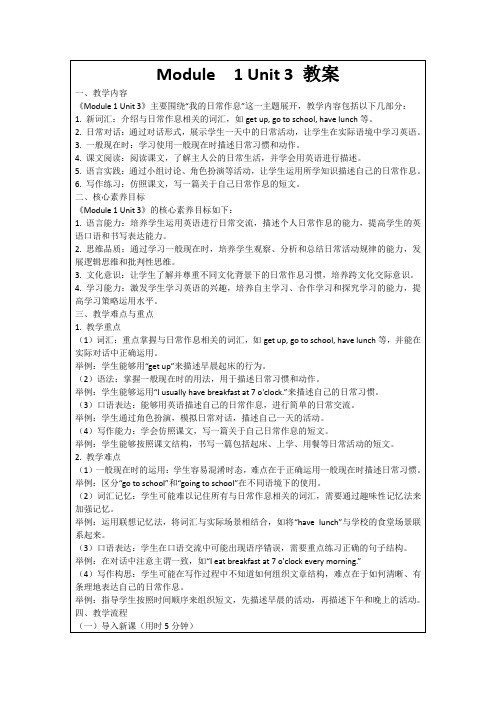
(四)学生小组讨论(用时10分钟)
1.讨论主题:学生将围绕“一般现在时在实际生活中的应用”这一主题展开讨论。他们将被鼓励提出自己的观点和想法,并与其他小组成员进行交流。
2.引导与启发:在讨论过程中,我将作为一个引导者,帮助学生发现问题、分析问题并解决问题。我会提出一些开放性的问题来启发他们的思考。
(3)口语表达:能够用英语描述自己的日常作息,进行简单的日ቤተ መጻሕፍቲ ባይዱ交流。
举例:学生通过角色扮演,模拟日常对话,描述自己一天的活动。
(4)写作能力:学会仿照课文,写一篇关于自己日常作息的短文。
举例:学生能够按照课文结构,书写一篇包括起床、上学、用餐等日常活动的短文。
2.教学难点
(1)一般现在时的运用:学生容易混淆时态,难点在于正确运用一般现在时描述日常习惯。
三、教学难点与重点
1.教学重点
(1)词汇:重点掌握与日常作息相关的词汇,如get up, go to school, have lunch等,并能在实际对话中正确运用。
举例:学生能够用“get up”来描述早晨起床的行为。
(2)语法:掌握一般现在时的用法,用于描述日常习惯和动作。
举例:学生能够运用“I usually have breakfast at 7 o'clock.”来描述自己的日常习惯。
1.语言能力:培养学生运用英语进行日常交流,描述个人日常作息的能力,提高学生的英语口语和书写表达能力。
2.思维品质:通过学习一般现在时,培养学生观察、分析和总结日常活动规律的能力,发展逻辑思维和批判性思维。
3.文化意识:让学生了解并尊重不同文化背景下的日常作息习惯,培养跨文化交际意识。
高中英语外研版必修一Module3知识点全解析
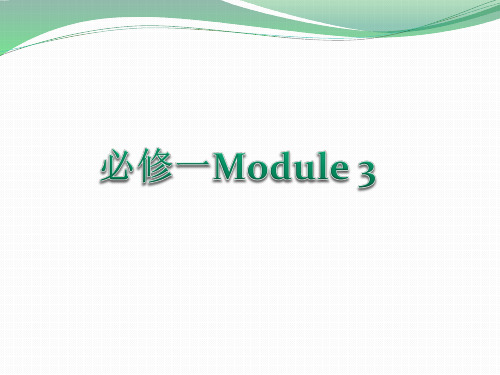
interview n C 1. 面谈,面试 The matter can't be discussed except at a personal interview.这件事只能在私人面谈时讨论。 Don't be late for your job interview.求职面试不能迟到。 C 2. 采访,交谈 In an exclusive interview with David Frost, the former president made many revelations.前 任总统在与大卫弗罗斯特的一次独家新闻采访中披露了许多事实。
scenery/ scene/ view/ sight ①scenery U, 表示“自然景色(全称)”,尤指开阔的景色,通常指乡村的整个面貌。 ②scene C, 指“风景,景象”,包括其中的人及其活动;另外,还可指“(发生事件的) 现场、地点,(舞台的)场景”。 ③view表示“风景,景色”,指从某一位置所看到的scenery的一部分,常用短语get a good view of. ④sight C, 表示“实力,景色,名胜”,往往指眼见的景色,如供人游览的风景名胜。 Our reporter was the first person on the scene. You’ll get a fine view of the town from the top of the hill. He lost his sight in an accident. We passed through the beautiful scenery on our journey through the Lake District. journey/ tour/ trip/ travel/ voyage ① journey “旅行”“旅程”。普通用语,指陆地上的远程旅行。 At first I was afraid the long journey would be too much for her. ② tour “周游”、指途中在许多地方作短暂停留的观光游览。 We went on a guided tour of Italy that included stops at Milan, Venice, Florence and Rome. ③ trip “旅行”。指来往有定的短距离旅行,强调在路上所花的时间和所走的路程。 I go to work by train, and the trip takes 40 minutes. ④ travel “旅行”。常用复数形式。泛指旅行各地,表示旅行的路途远,时间长。 The travels of Marco Polo is one of the most interesting books that I have ever read. ⑤ voyage 指不论路程长短的水上或空中的“游历,旅行”。 He went on a voyage round the world.
北师大版英语模块1 unit3 语言点

9. link
vt. & vi.连接, 联系 The two companies have linked. The road links all the new towns. n.环, 联系, 纽带 Each link that makes up a chain is equally important.
8. contribute
Vt. 捐献,捐助 Everyone should contribute his share in building a stronger a China. An increase in the price of drugs has contributed to the rising cost of medical care. 导致,有助于 Fresh air contributes to our health. N. contribution make contributions to 为……做贡献
marriage n They don’t believe in marriage. married: adj. 已婚的, 婚姻的,结婚的 unmarried? She is married to John. Are you enjoying your married life? Be married to 专心于,全神贯注 My brother is married to his job.
7. congratulation
N. 祝贺,庆贺 Congratulations on the wonderful performance. V. congratulate Congratulate sb. on/upon sth. She congratulate me warmly on my exam results.
2018秋外研版英语九年级上册Module1同步教案:Unit3

一、教学内容
2018秋外研版英语九年级上册Module 1同步教案:Unit 3主要围绕“Travel”主题展开,涵盖以下内容:
1.教材章节:Module 1 Unit 3 Travel
2.语言技能:阅读理解、听力理解、口语表达和写作能力
(三)实践活动(用时10分钟)
1.分组讨论:学生们将分成若干小组,每组讨论一个与旅行相关的实际问题,如如何用英语描述旅行中的美食、景点等。
2.实验操作:为了加深理解,我们将进行一个角色扮演活动。这个活动将模拟在机场、酒店等场景中的英语对话。
3.成果展示:每个小组将向全班展示他们的讨论成果和角色扮演的结果。
(五)总结回顾(用时5分钟)
今天的学习,我们了解了旅行中的英语表达、重要性和应用。同时,我们也通过实践活动和小组讨论加深了对旅行相关词汇和语法的理解。我希望大家能够掌握这些知识点,并在日常生活和未来的旅行中灵活运用。最后,如果有任何疑问或不明白的地方,请随时向我提问。
五、教学反思
在今天的教学过程中,我发现学生们对旅行这个话题非常感兴趣,他们在讨论和角色扮演活动中表现得很积极。这让我意识到,将现实生活中的情境融入英语教学,能够有效激发学生的学习热情。
三、教学难点与重点
1.教学重点
(1)词汇:本节课的核心词汇包括passport, destination, sightseeing, scenery, customs等,这些词汇是描述旅行经历的基础,教师应着重讲解并让学生熟练掌握。
(2)语法:一般现在时、现在进行时、一般过去时和过去进行时的运用是本节课的重点。学生需要学会如何运用这些时态描述旅行中的不同情景。
在讲授旅行相关词汇和语法时,我尽量用生动的例子和实际的场景来解释,让学生能够更好地理解和记忆。通过对比不同时态的用法,学生们对一般现在时、现在进行时等语法点的掌握有所提高。但同时我也注意到,部分学生在词汇记忆和语法运用上还存在一些困难,这需要我在今后的教学中进一步关注和指导。
- 1、下载文档前请自行甄别文档内容的完整性,平台不提供额外的编辑、内容补充、找答案等附加服务。
- 2、"仅部分预览"的文档,不可在线预览部分如存在完整性等问题,可反馈申请退款(可完整预览的文档不适用该条件!)。
- 3、如文档侵犯您的权益,请联系客服反馈,我们会尽快为您处理(人工客服工作时间:9:00-18:30)。
Unit3语言点同步讲解
1.stay(与remain同义)
A)作联系动词,为“保持某种状态”
One can’t expect to stay young forever.
没有人能期望永远年轻。
It is reported that the weather will stay hot for some days.
据说天气还要持续炎热。
B)作不及物动词。
为“留下,留在”如:
Don’t stay out too late.
不要在外边呆得太久。
I’ll stay to see what will happen.
我将留下来观看事态的发展。
2.exercise作“锻炼”讲时,是不可数名词。
Every day he does lots of exercise.
作“锻炼”讲时,是可数名词。
Every day the students must do lots of exercises.
3.dying是die的现在分词,用做形容词,为“快要死的”“快要消失的”
Nothing can save the dying person.
什么也拯救不了这个要死的人。
Add some wood to the dying fire.
“dying to do sth”为“非常渴望做某事”
I am dying to see you.他想见你想得要死了。
4“figure”A)为“身材、身影”
The girl has a good figure.
他有一个好身材
I saw a figure in the night and disappeared quickly.我看到黑暗中有一身影然后消失了。
B)“画像、肖像、数字、图表”
He has an income of six figures
(他的收入有六位数)
Look at the two figures in the book.
(看书中的两幅图)。
C)figure作动词与out连用“弄明白、计算出”
Have you figured out(worked out)how much the holiday cost?(你算出假期的开销了吗?)
I have never been to figure him out.
(我从未理解过他)。
5.“especially”为”尤其、特别”
I don’t like bright colours,especially red.
我不喜欢鲜艳的颜色,尤其是红色。
This is a very common word,especially in spoken English.
在是一个很常见的词,尤其在口语中。
I like the country,especially in spring.
我喜欢乡下,尤其在春天。
Noise is unpleasant,especially when you are going to sllep.
噪声使人不快,尤其当你要入睡时。
6)A)ashamed是表语形容词,后接“of”短语,that从句或动词不定式。
He felt ashamed of having done so little work
他只因做了一点点工作而感到惭愧。
She feels too ashamed to ask for help.他不好意思让人家帮忙。
B)shame是名词,为“羞愧”可耻的”
It’s a shame to cheat in the exam.考试中作弊是可耻的。
7) “work”为“运转、开动、有效、行得通”
His mother keeps asking him not to smoke,but it doesn’t work.
他妈屡次告戒他不要吸烟,但是不管用。
I bought a recorder yesterday here,but it doesn’t work.
昨天我在这儿买了一台录音机,但是不响。
Your idea sounds good,but it won’t work.你的想法不错,但行不通”
8)“recover”为“恢复到正常状态”
He has fully recovered from his illness.他已经完全康复了。
The city has recovered form the war.小城已经从战争中恢复了。
9)“match”A)作为名词用为“配偶”“比赛”“相匹配的人或物”
He is a good match.(他是一个好丈夫)
The chairs and desks are a good match.这些椅子和桌子很相配。
B)match作为动词为“胜过”“比得上”“与配套”
He is so excellent,no one can match him.他是如此优秀,无人能比。
No one can match him in knowledge of English.
Why not buy a tie to match your shirt?为什么不买一个领带配你的衬衫。
10)“worth”为形容词“价值、值什么分量”、
The car is worth 30000 yuan.
His suggestion is worth nothing.他的建议没有价值。
The film is worth seeing.这部电影值得一看。
The book is worth reading a second time.这本书值得读第二遍。
11.“touch”A)作”感动、触动”相当于“move”
They were greatly touched(moved)by the old man’s story.
听了老人的故事,他们很受感动。
It is such a touching(moving) story that we were touched(moved) by it.
故事如此感人我们都很感动。
B)“touch”作“接触,触碰”讲
Someone touched me on the shoulder.某人碰了一下我的肩膀。
12.“embrrass”做及物动词为“使人感到困窘、尴尬”用法同“excite,interest,frustrate.touch”The situation embrrassed me very much.这种情形使我感到很尴尬。
We were embrrassed at the embrrassing situation.。
